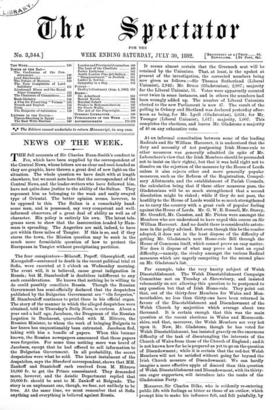At an informal consultation between some of the leading Radicals
and Sir William Harcourt, it is understood that the duty and necessity of not postponing Irish Home-rule to other measures was generally admitted (in spite of Mr. Labouchere's view that the Irish Members should be persuaded not to insist on their rights), but that it was held right not to dissolve on the rejection of the measure by the House of Lords unless it also rejects other and more generally popular measures, such as the Reform of the Registration, Compul- sory Allotments, and the establishment of Parish Councils, the calculation being that if these other measures pass, the Gladstonians will be so much strengthened that a second dissolution might be risked ; while if they do not pass, the hostility to the House of Lords would be so much strengthened as to carry the country with a great rush of popular feeling against the House of Lords. Mr. G. W. E. Russell, Mr. Storey, Mr. Grenfell, Mr. Causton, and Mr. Picton were amongst the Members who are understood to have urged this course on Sir William Harcourt. And no doubt there is considerable astute- ness in the policy advised. But even though this be the resolve adopted, it does not in the least dispose of the difficulty of getting Mr. Gladstone's next Home-rule Bill through the House of Commons itself, which cannot prove an easy matter. Nor does it dispose of what may prove at least an equal difficulty,—namely, the rivalry amongst the various Radical measures which are eagerly competing for the second place on Mr. Gladstone's list.


































